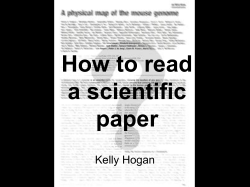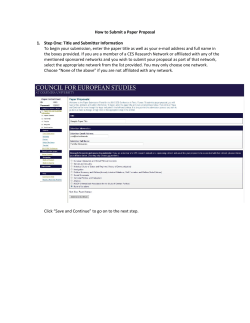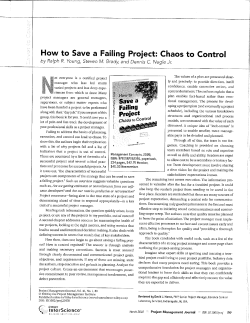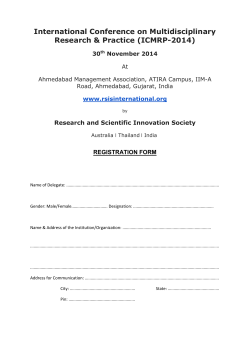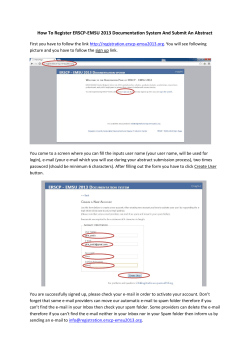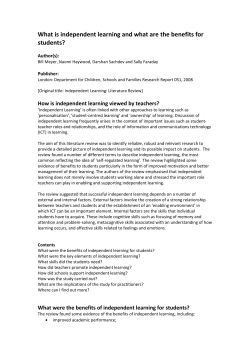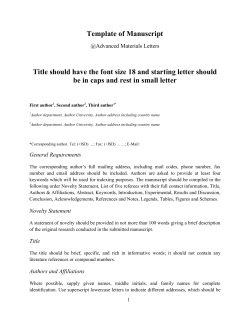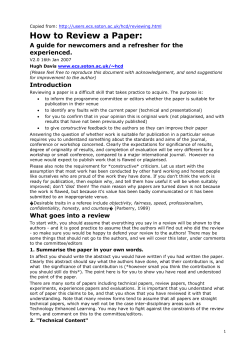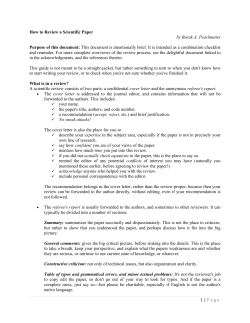
No. 2/2014 CONTENTS I
No. 2/2014 CONTENTS INTERNATIONAL SECURITY. FOCUS ON RUSSIAN FEDERATION Andreea-Paula IBĂNESCU, Rusia și geopolitica energiei. Abordări în Mediterana de Est și Orientul Mijlociu ................................................ 7 Flavius-Mircea STAN, Georgia între interesele ruse și opțiunea prooccidentală. Rolul Partneriatului Estic ............................................... 18 Svetlana CEBOTARI, Russian Federation's geopolitic interests in the South Eastern Europe ....................................................................... 31 Roxana-Ioana NEGOI, Politici ale Federației Ruse în problema Parteneriatului Estic.......................................................................... 44 NATIONAL SECURITY Corvin LUPU, Cauze ale dezertării generalului Ion Mihai Pacepa în lumina unor documente din arhivele Securității.................................. 58 Ganna KHARLAMOVA, The Level of the State Security: from local to global................................................................................................ 76 HUMAN SECURITY Oleksii KHARLAMOV, Marina BONDARENKO, Ganna KHARLAMOVA, Anthology of Threats of Human Security from nanodimensional objects and genomodificated products........................................................... 85 Stelian SCĂUNAŞ, Securitatea educației – obligație a statului și condiție fundamentală pentru un viitor prosper ............................................ 103 POLITICAL SECURITY Florian FLÖRSHEIMER, Democratic movement and auhoritarian populism ......................................................................................... 111 Serghei SPRINCEAN, Presiunea politică, bioetica și securitatea globală ....................................................................................................... 117 1 MILITARY STUDIES Luciana-Flavia PUCEA, Cooperarea europeană în domeniul armamentelor ................................................................................. 127 Eugen STRĂUŢIU, Forțele militare în regiunea transnistreană. Evaluări cantitative și calitative ..................................................................... 142 Nicoleta Anne-Marie MUNTEANU, Operația mass-media și operațiile militare moderne. Cooperarea civili-militari (CIMIC) .......................... 151 GEOPOLITICS Vasile TABĂRĂ, Rolul NATO în realizarea securității și apărării euroatlantice ................................................................................... 160 Dănuț-Florin SANDOVICI, Reacția statelor occidentale față de „Primăvara Arabă” – între expectativă și angajare selectivă ............. 169 DIPLOMACY AND INTERNATIONAL LAW Valentin – Stelian BĂDESCU, Problematici de securitate în zonele martitime nesupuse jurisdicției naționale. Protecția mediului și securitatea comunicațiilor ................................................................ 183 Lucian GIURA, Maura-Geraldina GIURA, Cauzele și ecoul internațional al demisiei cancelarului Willy Brandt. Perspectiva diplomatică românească .................................................................................... 191 Radu TABĂRĂ, Sancționarea crimelor de război în antichitate și evul mediu.............................................................................................202 BOOK REVIEWS Eugen STRĂUȚIU, Mobilizare și protest, Editura Universității „Lucian Blaga” din Sibiu, 2013 (autor Ionel Nicu Sava)................................. 211 EVENTS RAPORT cu privire la desfăşurarea Conferinţei Internaţionale „Ştiinţe Politice, Relaţii Internaţionale şi Studii de Securitate” (ediţia a VIII-a, Sibiu, 23-25 mai 2014)........................................................................213 2 Andreea-Paula IBĂNESCU Middle East Political and Economic Institute of Bucharest RUSIA ȘI GEOPOLITICA ENERGIEI. ABORDĂRI ÎN MEDITERANA DE EST ȘI ORIENTUL MIJLOCIU Title: RUSSIA AND THE GEOPOLITICS OF ENERGY. APPROACHES IN MIDDLE EAST AND EASTERN MEDITERRANEAN By assessing Russia’s post-1990 availability and the current Abstract: encumbrances/challenges met in influencing the energy dynamics in both the Eastern Mediterranen and the Middle East, one reflects the objective of this analysis. The purpose is to substantiate what motivates Russia to propel sedulous intercessions within the geopolitical jockeying and to what extent the regional gamesmenship and the political infightings refer to Russia’s international weight. The analysis extols regional interdependencies and trans-continental projects (connecting Central Asia–the Caucasus–Europe or Central Asia–the Middle East–Europe), as it may disclose Russia’s manifold undertakings for precluding the functionality of these emulous corridors. The aim is to persevere in several potential scenarios, by following an analysis vector from general-to-particular, regarding Russia’s position in the Middle East and the conceivable emergence the region may stand to witness in terms of energy geopolitics. One should therefore consider premises like the impact of an arguable North-South axis, the viability of Iran’s envisioned energy pipelines and Russia’s afferent impact. The political, strategic and energy volatility of the Middle East requires chiefly a transversal approach to Russia’s bilateralism with several regional actors like Iran and Syria, or Cyprus and Greece. Keywords: Russia, the Middle East, the Eastern Mediterranean, Pipelines, Geopolitical vectors, Strategic corridors Contact E-mail: ap.ibanescu@mepei.com details of the authors: Institutional affiliation of Middle East Political and Economic Institute the authors: Quadra Place, Str. Fabricii 47, Ap. B32, București Institutions Website: www.mepei.com address: Flavius-Mircea Stan University of Bucharest Faculty of History GEORGIA ÎNTRE INTERESELE RUSE ŞI OPŢIUNEA PRO-OCCIDENTALĂ. ROLUL PARTENERIATULUI ESTIC Title: GEORGIA BETWEEN THE RUSSIAN INTEREST AND PROWESTERN OPTION. ROLE OF THE EASTERN PARTNERSHIP Looked upon generally as a political and economic union, the European Abstract: Union is based on the continous integration without a predetermined conclusion. Up to now, the integration politic of the countries found in the East of Europe was mainly done by the EU throught integration promises. Despite this, almost all countries that form the EU expressed their concern in relation to the expansion of the union. This reaction was related to the integration steps that have taken place in 2004 and 2007, which were 3 Keywords: Contact details of the authors: Institutional affiliation of the authors: Institutions address: thought to threaten the EU capability to react to different problems/contexts. The present paper serves as an evaluation of the PaE in Georgia, since its lauching on the 7th of May 2009 which took place in Praga to the Vilnius Summit, taken place between the 28-19th of november 2013. Why South Caucasus, and as a logic deduction Georgia? Why was PaE created and developed? Is PaE a good alternative for the neighbouring countries of the EU? What makes PaE apart from PEV? Which are the results of the implementation process of PaE in Georgia up to present and which are the perspectives of this political initiative? These are only a few of the questions that the present study will be answering regarding the subject. Easterrn Partnership, Foreign Policy, Association Agreement, Security, Free trade, Democracy, Caucasus E-mail: stanmircea90@gmail.com Faculty of History, University of Bucharest Adresa: Bd. Regina Elisabeta 4-12 Sector 5, cod 030018, Bucureşti, Tel: 021.314.53.89, 021.314.53.89, Tel/Fax: 021.310.06.80 Email: secretariat@istorie.unibuc.ro Svetlana CEBOTARI State University of Moldova, Chișinău Faculty of International Relations, Political and Administrative Sciences RUSSIAN FEDERATION'S GEOPOLITIC INTERESTS IN THE SOUTH EASTERN EUROPE Title: RUSSIAN FEDERATION'S GEOPOLITIC INTERESTS IN THE SOUTH EASTERN EUROPE The methamorphoses from the European space, the results from the Abstract: collapse of the USSR, the NATO and the UE to East, make the relations between the Russian Federations and the states from the south -east Europe to be present in the political Russian-European dialogue. To the part of south - east European states the attitude from the part of the Russian Federation is conditionated from the not so far past , the undeterminated future, and the suspicions of the neo-imperialist intentions of Russia. The democratical Revolutions from the South -East European states caused radical transformations, so in the interior of the area and the economic-comercial relations between Russia and south-east European countries, relations characterized and based on pragmatism. European states caused radical transformations, especially in Poland, Cehia and Hungary. The present article analyses the geostrategical interests of the Russian Federation in South- East European area and the economic-comercial relations between Russia and south--east European countries, relations characterized and based on pragmatism. Keywords: Space, South-East Europe, Russian Federation, Economical-comercial relations, Geopolitical interests, Influence sphere, Strategy Contact E-mail: svetlana.cebotari@mail.ru details of the 4 authors: Institutional affiliation of the authors: Institutions address: The State University of Moldova A. Mateevici 60 str.MD -2009, Chisinau, Republic of Moldova, Tel. +373 22 797122, http://www.usm.md Roxana Ioana NEGOI Center for European Policy Evaluation POLITICI ALE FEDERAȚIEI RUSE ÎN PROBLEMA PARTNERIATULUI ESTIC Title: POLICIES OF RUSSIAN FEDERATON ON THE EASTERN PARTENRSHIP The article is about how Russia uses its foreign policy and soft power to Abstract: attract and maintain its influence in the near abroad area. Each country in the Eastern Partnership will be analyzed politically and strategically in relation to Russia. All the history of EaP since 2009 will be written again for every country with specific accent on the policy making of Russia that influenced final results. Precisely, the most important game for Russia is to stop EU from stepping in its near abroad yard or tasting a piece of the Post-Soviet states cake, if not the entire cake. By providing a landscape for each and every EaP member country since 2009, the article will debate on the most important steps backward or forward on the road before and after Vilnius 2014, with particular emphasis on Kremlin’s role to shape decisions in the EaP race. Keywords: Foreign Policy, Security, Influence, Near Abroad, European Union Contact details of the authors: Institutional affiliation of the authors: Institutions address: E-mail: roxananegoi@yahoo.com Center for European Policy Evaluation Str. Fizicienilor, nr. 16, bl. 10A, sc. 1, ap. 19, sector 3, Bucureşti, http://cepeoffice.com/, 0722-773.779, cepeoffice@gmail.com, office.cepe@yahoo.ro Corvin LUPU Lucian Blaga University of Sibiu Faculty of Social Sciences and Humanities Departament of International Relations, Political Science and Security Studies CAUZE ALE DEZERTĂRII GENERALULUI ION MIHAI PACEPA ÎN LUMINA UNOR DOCUMENTE DIN ARHIVELE SECURITĂȚII Title: THE CAUSES OF THE DESERTION OF GENERAL ION MIHAI PACEPA ILLUSTRATED BY DOCUMENTS OF THE ROMANIAN INTELLIGENCE SERVICE BEFORE 1989 (THE “SECURITATE”) The article presents the main causes which determined General Ion Mihai Abstract: Pacepa, assistant director of the Romanian Intelligence Service, to desert in the U.S.A., in July 1978, as they result from unclassified documents from the archives of this service (The “Securitate”). Pacepa owned important state functions and very important secrets, so that 5 Keywords: Contact details of the authors: Institutional affiliation of the authors: Institutions address: his desertion had serious consequences for Romania, not only for the political system of that time. The researches certify that Pacepa worked both for the Soviet secret services and for the C.I.A. The author excludes the idea that Pacepa deserted because he was loathing the communist system or Nicolae Ceaușescu. General Pacepa served the communist regime with loyalty, fact proved by the high ranks and the important state functions he got during the 27 years while he worked in the Romanian espionage. The article shows that Pacepa was suspected for treason and for corruption; he got into a critical situation, and decided to leave Romania and surrendered in Washington. In the same time, general Pacepa’s desertion served Russian interests to defame Nicolae Ceaușescu, and to carry out the ”Dniestr” plan of replacing him with a pro-Russian communist leader. The author relates to some of the thesis about the subject which he doesn’t agree with, the way they are presented, in some of the papers that he indicated as bibliography. Ion Mihai Pacepa, Traitors, History of the secret services, Nicolae Ceaușescu, Espionage, Cold war espionage, E-mail: corvinlupuro@yahoo.com Lucian Blaga University in Sibiu, Romania, Department of International Relations, Political Science and Security Studies Calea Dumbrăvii Street, No. 34, 550324, Sibiu, Romania, Phone: 0040269422169 Ganna KHARLAMOVA Taras Shevchenko National University of Kyiv THE LEVEL OF THE STATE SECURITY: FROM LOCAL TO GLOBAL Title: THE LEVEL OF THE STATE SECURITY: FROM LOCAL TO GLOBAL State security is considered from the position: Genesis, Contemporary Abstract: condition, Prospects. The retrospective analysis gives the basis to consider it as not the level of states security but as a function sphere that is flexible to the set of indicators variation and only some exact reaction of indicators on situation in the state in some exact observed moment could be considered as a secure state or its absence / weakness. So the main task of the research is to collect the optimal set of indicators – markers that provide the information about the state security in any moment with (litmus) the most precise calibration. Keywords: Security, National security, Index, Threats, Indicators – Markers Contact details of the authors: Institutional affiliation of the authors: Institutions address: E-mail: akharlamova@ukr.net Taras Shevchenko National University of Kyiv 90-A, Vasyl’kivs’ka St., 03022, Kyiv, Ukraine, tel. (067) 449-20-45, www.econom.univ.kiev.ua 6 Oleksii KHARLAMOV (1) Frantsevich Institute for Problems of Materials Science of NASU Marina BONDARENKO (2) Frantsevich Institute for Problems of Materials Science of NASU Ganna KHARLAMOVA (3) Taras Shevchenko National University of Kyiv ANTHOLOGY OF THREATS OF HUMAN SECURITY FROM NANODIMENSIONAL OBJECTS AND GENOMODIFICATED PRODUCTS Title: ANTHOLOGY OF NANOOBJECTS AND GMO THREATS Abstract: Keywords: Contact details of the authors: Institutional affiliation of the authors: Institutions address: The anthology of nanodimensional objects (NDO) and geneticallymodifited products (GMP) from their discovery, research of properties and application before the detection of threats of their harmful and toxic influence on plants, animal and microorganisms is considered. On the basis of the review of properties is shown, that the threats connected to manufacture and application NDO and GМP can be compared with the destructive influence of the weapon of a mass defeat, such as, for example, radiating, chemical or bacteriological. However the specificity of a toxic influence of NDO and GМP (as against the already known weapon of a mass defeat) can be strictly located on the certain object (or a number of objects). NDO and GМP can get in internal organs of living organism (or in microorganisms) mainly together with food, to destroy or to change their functional features. One of the unique features of such kind of a scientific discovery is that fact, that between the opening of such innovations, their mass production and the comprehension of them as threats of a mass defeat there passes rather large period of time – lag reaches 10-th of years that essentially complicates in time to develop effectual measures of safety. GM food, Nanotoxicology, Safety, Nanochemistry, Nanology, Health E-mail: akharlamov@ukr.net (1) Frantsevich Institute for Problems of Materials Science of NASU (1), (2) Taras Shevchenko National University of Kyiv (3) (1), (2) 3, Krzhizhanovsky str., 03680, Kyiv-142, Ukraine, tel. (044)42402-56, fax: 380(44)424-21-31, http://www.materials.kiev.ua; (3) 90-A, Vasyl’kivs’ka St., 03022, Kyiv, Ukraine, tel. (044) 259-70-43, fax: (044) 259-70-08, www.univ.kiev.ua Stelian SCĂUNAŞ Lucian Blaga University of Sibiu Faculty of Social Sciences and Humanities Departament of International Relations, Political Science and Security Studies SECURITATEA EDUCAŢIEI – OBLIGAŢIE A STATULUI ŞI CONDIŢIE FUNDAMENTALA PENTRU UN VIITOR PROSPER Title: SECURITY OF EDUCATION - OBLIGATION OF STATES AND A PREREQUISITE FOR A PROSPEROUS FUTURE Security, seen not only in the classical context of an armed conflict, must Abstract: aim and have as final purpose the education. If security of education is not provided, the destiny of a society politically organized as a state, would undoubtedly be uncertain. If we take a look in the past, we will find out that 7 Keywords: Contact details of the authors: Institutional affiliation of the authors: Institutions address: many states have perished throughout history for neglecting the education of their populations, in addition to many other causes, but states that have invested in education have seen a remarkable economic, political, diplomatic and even military development. This study seeks to point out some issues that Romania (not only) should consider within its political horizon, for education to become an area of great national interest in the near future - and not what it has become in the last quarter century - a real threat to national security. National security, Security of education, Education policy, Education reform E-mail: scaunass@yahoo.com Lucian Blaga University of Sibiu, Faculty of Social Sciences Department of International Relations, Political Science and Security Studies Calea Dumbrăvii Street, No. 34, Phone: +40.269.422.169, Fax: +40.269.422.169, e-mail: spriss@ulbsibiu.ro, web: http://spriss.ulbsibiu.ro Florian FLÖRSHEIMER Berlin School of Economics and Law DEMOCRATIC MOVEMENT AND AUTHORITARIAN POPULISM Title: DEMOCRATIC MOVEMENT AND AUTHORITARIAN POPULISM The article deals with the social protests i.e. democratic movements in Abstract: recent years in countries like Tunisia, Egypt, but also Russia or Ukraine, with not only a few democratic deficits. These protests started with great expectations from their actors but also in other, especially western democratic societies. Generally speaking, they all had disappointing ends, not at least concerning changes in democratic culture and institutionalization. Instead, what appeared was a kind of authoritarian populist strategy. The author follows the question of why this has happened and therefore relies on the some explanations based on the theoretical approach of present materialist state theory. This article was originally presented as a conference paper at the VIII. International Conference of the Department of International Relations, Political Science and Security Studies, 23-25 May 2014, Sibiu, Romania. Keywords: Arab Spring, Authoritarianism, Democracy, Egypt, Hegemony, Neoliberalism, Populism, Social Protest, State, Ukraine E-mail: Florian.Floersheimer@gmx.net, Florian.Floersheimer@uniContact rostock.de, e_floersheimer@doz.hwr-berlin.de details of the authors: Institutional Berlin School of Economics and Law, Department for Police and affiliation of Security Management the authors: Alt-Friedrichsfelde 60, 10315 Berlin, Germany Institutions address: Serghei SPRINCEAN Institute of Legal and Political Researches Academy of Sciences of Moldova 8 PRESIUNEA POLITICĂ, BIOETICA ȘI SECURITATEA GLOBALĂ Title: POLITICAL PRESSURE, BIOETHICS AND GLOBAL SECURITY Abstract: Keywords: Contact details of the authors: Institutional affiliation of the authors: Institutions address: Title: Radical transformation of political pressures phenomenon in conditions of informatisation an bioethization of society represents one of specific elements of contemporary political life. The success of pressure groups activity has become dependent on quality of information in its possession, as well as on its general bioethical and bio-beneficent character, which has allowed a wider social-political acceptance of its goals. Bioethics become a crucial element in the social institutional mechanism for designing and social disseminating of a profound and equidistant security strategic reflection as well as of decision and attitude making processes in specific cases related to divers menaces of biological and moral origins and moreover, in the field of medical genetics. The Bioethical approach applied in political science researches has adopted new and original shapes of scientific interest, in the perspective of elaboration of basic principles of new global governing in correlation with moral and noospherical research strategy, with the inevitable purpose to offer a viable possibility to humankind to qualitatively survive in the context of contemporary environmental, economic, political and moral global crises. Political pressure, Global crisis, Bioethics, Security, Bioethization, Influence. E-mail: sprinceans@yahoo.com Institute of Legal and Political Researches of Academy of Sciences of Moldova 1, Stefan cel Mare av., MD-2001, Chisinau, Republic of Moldova Luciana-Flavia PUCEA Faculty of Humanities, Political and Administrative Sciences "Vasile Goldis" Western University of Arad COOPERAREA EUROPEANĂ ÎN DOMENIUL ARMAMENTELOR EUROPEAN ARMAMENTS COOPERATION Abstract: The common defence, the arms market and industry figure among the most complex topics of European integration, given that, through those topics, the problematic issues of political integration and more particularly the integration of the tools of sovereignty are posed. Nevertheless, a common European defence market doesn’t seem to be a taboo in Brussels anymore, but an essential condition for more coherence and efficiency inside the CSDP. There is a growing acceptance of the need for a common European defence effort, for ways to maximize armaments cooperation and to pool resources in the defence industry. The analysis undertaken offers an overview of the European defence sector, the dynamics of the European defence market, as well as the evolution of the European efforts to promote cooperation and integration in this sector. Lastly, some recommendations are made concerning the measures that could be taken at the European level in the short and medium term, in order to promote a strong and competitive European 9 defence industrial base. Keywords: Defence Technological and Industrial Base (DITB), European armament cooperation, European armament agency, Military capabilities, Defence acquisition policy. Contact details of the authors: Institutional affiliation of the authors: Institutions address: E-mail: pucea_luciana@yahoo.com "Vasile Goldis" Western University of Arad, Faculty of Humanities, Political and Administrative Sciences - Department of International Relations and European Studies Unirii Street, No. 3, Arad, 310123, Phone: +40.257.282.324, Fax: +40.257.282.324, e-mail: supa@uvvg.ro , web: http://supa.uvvg.ro/ Eugen STRĂUŢIU Lucian Blaga University of Sibiu Faculty of Social Sciences and Humanities Departament of International Relations, Political Science and Security Studies FORȚELE MILITARE ÎN REGIUNEA TRANSNISTREANĂ. EVALUĂRI CANTITATIVE ȘI CALITATIVE Title: MILITARY FORCES IN THE TRANSNISTRIAN REGION. QUANTITATIVE AND QUALITATIVE ASSESSMENTS After the end of the war on Dniestr (1992), the self-proclaimed Abstract: Transnistrian Moldovan Republic has consistently followed an ambitious plan for endowment military structures and has driven its??? in order to run at any time, successful defensive and offensive operations to address potential enemies - primarily in relation to Chisinau, secondly in relation to Ukraine. The Transnistrian armed forces, totaling capabilities organized by the "de facto" Transnistrian state and the Russian one seem oversized compared to the usual needs for defense of a very small state. But geopolitical and geostrategic needs are disproportionately high compared to the surface and population. Keywords: Military Forces, Armed Forces, National Security, International security, Transnistrian conflict, Transnistrian region, Republic of Moldova Contact E-mail: eugen.strautiu@ulbsibiu.ro details of the authors: Institutional Lucian Blaga University of Sibiu, Faculty of Social Sciences and affiliation of Humanities - Department of International Relations, Political Science the authors: and Security Studies Calea Dumbrăvii Street, No. 34, Phone: +40.269.422.169, Fax: Institutions +40.269.422.169, e-mail: spriss@ulbsibiu.ro, web: http://spriss.ulbsibiu.ro address: Nicoleta Anne-Marie MUNTEANU Lucian Blaga University of Sibiu Faculty of Social Sciences and Humanities Departament of International Relations, Political Science and Security Studies OPERAŢIA MASS-MEDIA ŞI OPERAŢIILE MILITARE MODERNE. COOPERAREA CIVILI-MILITARI (CIMIC) 10 MEDIA OPERATIONS AND MODERN MILITARY OPERATION. CIVIL-MILITARY COOPERATION (CIMIC) Media operation affects CIMIC activities, being an active component of a modern military mission, in order to facilitate interaction between commanders and forces in theaters of military operations and civil society to ensure the success of the military mission in a heterogeneous, complex, often hostile. Consequently, the relations of cooperation and mutual support existing or formed between the military institution, central and local government authorities, international organizations, NGOs and civilians final aim objectives of all parties involved. Depending on the specific activity of the CIMIC forces and their duration, media operation can help spread a positive image through media messages, which carries certain characteristics. Media operations, CIMIC, Cooperation, Strategy, Military operations Title: Abstract: Keywords: Contact details of the authors: Institutional affiliation of the authors: Institutions address: E-mail: nicoleta.munteanu@ulbsibiu.ro „Lucian Blaga” University of Sibiu, Faculty of Social Sciences and Humanities Calea Dumbrăvii Street, No. 34, Phone: +40.269.422.169, Fax: 040.269.422.169, e-mail: spriss@ulbsibiu.ro, web: http://spriss.ulbsibiu.ro Vasile TABĂRĂ Lucian Blaga University of Sibiu Faculty of Social Sciences and Humanities Departament of International Relations, Political Science and Security Studies ROLUL NATO ÎN REALIZAREA SECURITĂŢII ŞI APĂRĂRII EUROATLANTICE Title: Abstract: Keywords: Contact NATO’S ROLE IN THE ACHIEVEMENT AND DEFENCE OF EURO-ATLANTIC SECURITY NATO, the most important politico-military alliance has overcome the identity crisis generated by the collapse of the Soviet Union, by means of reform and modernization, nowadays having the necessary capacities to act all over the globe. In order to fulfil its missions NATO cooperates with the UN, EU, OSCE and other organizations. The Treaty of Lisbon provided NATO with a more active role in the international arena, its strategy including several elements: it argues for the complete destruction of the nuclear arsenals; the capacity to defend itself against missile attacks; engagement in the prevention of crises that have the potential to degenerate in open conflict both in the phase of prevention and in that of post conflict stabilisation and reconstruction. Terrorism is considered a direct threat to the security of the Alliance. The conflicts that take place outside NATO’s borders , that fuel extremism and the traffic of weapons, humans and drugs can also be perceived as a threat. NATO has also announced its intention to contribute to the energy security and encouragement of treaties with other countries. NATO, Security, Humanitarian intervention, Program for Individual Partnership, International law E-mail: vasile.tabara@ulbsibiu.ro 11 details of the authors: Institutional affiliation of the authors: Institutions address: Lucian Blaga University of Sibiu, Faculty of Social Sciences and Humanities – Department of International relations, Political Science and Security Studies Calea Dumbrăvii Street, No. 34, Phone: +40.269.422.169, Fax: +40.269.422.169, e-mail: spriss@ulbsibiu.ro, web: http://spriss.ulbsibiu.ro Dănuț-Florin SANDOVICI „Carol I” National University of Defence, Bucharest REACȚIA STATELOR OCCIDENTALE FAȚĂ DE „PRIMĂVARA ARABĂ” ÎNTRE EXPECTATIVĂ ȘI ANGAJARE SELECTIVĂ Title: THE REACTION OF WESTERN COUNTRIES TOWARDS “THE ARAB SPRING” – BETWEEN EXPECTATION AND SELECTIVE ENGAGEMENT The uprisings that broke out in the Arab world in late 2010 and early 2011 Abstract: were a surprise for most of the Western countries. Their reaction to the protests in Tunisia, Egypt, Libya, Yemen, Syria and Bahrain has oscillated between wait-and see and selective engagement. After a period of evaluation of these developments, the European Union initiated a number of programs to support democratic transition in the southern Mediterranean Arab states. U.S. preferred a selective involvement in the region, hardly giving up supporting the regimes in Egypt and Yemen, overlooking the counter-revolution in Bahrain, helping to overthrow the Libyan regime and showing a restrained attitude towards the events in Syria. Geopolitical considerations and direct interests of each Western state in the Middle East have played a more important role than the imperative to support democratic transition in the Arab world. Keywords: Democracy, Transition, Protests, Uprising, Geopolitics, Interests Contact details of the authors: Institutional affiliation of the authors: Institutions address: E-mail: dfsandy@yahoo.com „Carol I” National University of Defence, Bucharest Panduri Road, No. 68-72, Sector 5, Bucureşti; Phone +40-21-3194880, Fax: +40-21-3194866, e-mail: public@unap.ro, web: http://www.unap.ro Valentin – Stelian BĂDESCU „Lumina” South-East Europe University of Bucharest Institute of Legal Research of Romanian Academy PROBLEMATICI DE SECURITATE ÎN ZONELE MARITIME NESUPUSE JURISDICŢIEI NAŢIONALE. PROTECȚIA MEDIULUI ȘI SECURITATEA COMUNICAȚIILOR Title: SECURITY ISSUES IN MARITIME AREAS NOT SUBJECT TO NATIONAL JURISDICTION. ENVIRONMENT AND COMMUNICATIONS SECURITY Freedom of navigation on the high seas (as well as in areas under the Abstract: national jurisdiction of states) is not effective unless it is exercised in a safe 12 Keywords: Contact details of the authors: Institutional affiliation of the authors: Institutions address: convenient. Although committed with caution in this way, states have tried to consolidate, and particularly the agreement, on the one hand, the minimum rules regarding seaworthiness of vessels and crew qualification and, on the other hand, the conditions of navigation. Public international law, International environmental law, Maritime areas not subject to national jurisdiction E-mail: valentinbadescu@yahoo.com Lumina - The University of South-East Europe Șos. Colentina nr.64b, Sector 2, 021187 București, Tel: 0212403022 Lucian GIURA (1) Faculty of Social Sciences and Humanities Lucian Blaga University of Sibiu Maura Geraldina GIURA (2) Faculty of Social Sciences and Humanities Lucian Blaga University of Sibiu CAUZELE ŞI ECOUL INTERNAŢIONAL AL DEMISIEI CANCELARULUI WILLY BRANDT. PERSPECTIVA DIPLOMATICĂ ROMÂNEASCĂ Title: THE CAUSES AND THE INTERNATIONAL ECHO OF WILLY BRANDT’S RESIGNATION The desecretization of some important fonds from the archives of the Abstract: Romanian Ministry of Foreign Affairs as well as the bibligraphy and the related information constitute the informational basis of the present article dedicated to a problem dealing with contemporary history. The theme of the article refers to „Gunter Guillaume Affair’’, which, besides other internal problems of Western Germany, caused the resignation of Willy Brandt. This study includes testimonies of some Romanian diplomats, accredited in some of the world’s capitals, testimonies referring to this case. All the information sent to the Romanian MAE from Bucharest represents an evident proof of the interest with which the events from Western Germany were watched by our rulers of the moment. . Keywords: Germany, Chancellor, Willy Brandt, Günther Guillaume, Espionaj, Resignation, Diplomacy. Contact E-mail: luciangiura1950@yahoo.ro (1), mauragiura@yahoo.com (2) details of the authors: Institutional Faculty of Social Sciences and Humanities, Lucian Blaga University of affiliation of Sibiu the authors: Bd. Victoriei Nr.5-7, Sibiu, 550024, România, tel.: +40-(269) 21.60.68fax: Institutions +40-(269) 23.29.66, E-mail: socioumane@ulbsibiu.ro address: Web: http://socioumane.ulbsibiu.ro 13 Radu TABĂRĂ „Carol I” National University of Defence, Bucharest SANCŢIONAREA CRIMELOR DE RĂZBOI ÎN ANTICHITATE ŞI EVUL MEDIU Title: THE SANCTION OF WAR CRIMES IN ANTIQUITY AND MIDDLE AGES Although war has been a constant presece in the analised period, there Abstract: were few rules to regulate its conduct, this issue beeng often at the mercy of the military commanders. According to our rules, war in Antiquity and the Middle Ages was barbaric, but for those times it was perfectly normal. Cruelty was intended as an example, which aimed at descouraging those who might want to challenge the authority of the winner or to fight him. In Antiquity there were some provisions that attempt to limit excesses, but with a limited and selective application. These rules were not an expression of humanitarian spirit, but of utility, in order for the winner to obtain maximum benefits from a victory (it was more profitable to sell as slaves the inhabitants of conquered cities than kill them). In the Middle Ages as a result of religious wars in Europe, or battles between Muslims and Christians, the situation worsened. However, in this dark period a first ray of hope appeared in the form of chivalric code, which although had a limited applicability, was a beginning. Keywords: War crimes, International humanitarian law, Antiquity, Middle Ages Contact details of the E-mail: radutabara@yahoo.com authors: Institutional affiliation of „Carol I” National University of Defence, Bucharest the authors: Panduri Road, No. 68-72, Sector 5, Bucureşti; Phone +40-21-3194880, Institutions Fax: +40-21-3194866, e-mail: public@unap.ro, web: http://www.unap.ro address: B O O K R E V IE W S IONEL NICU SAVA, Mobilizare și protest, Editura Universității „Lucian Blaga” din Sibiu, 2013 (RECENZIE) - Eugen STRĂUȚIU EVENTS RAPORT cu privire la desfăşurarea Conferinţei Internaţionale „Ştiinţe Politice, Relaţii Internaţionale şi Studii de Securitate” (ediţia a VIII-a, Sibiu, 23-25 mai 2014) 14
© Copyright 2025
